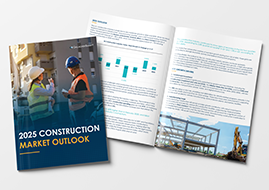By: Bill Bower

March 04, 2024 — Medical errors are the third leading cause of death in the US, with these mistakes often going unreported. (Anderson and Abrahamson 2017) As the healthcare industry works to reduce medical errors, the recruitment of various modalities has been employed in an effort to mitigate medical misadventure and improve overall patient care and satisfaction. To this end, in recent years, both artificial intelligence (AI) and intelligent automation have played a greater role.
At a very high level, AI replicates how human beings think, and intelligent automation replicates how we act. Both are being used at an increasing rate and are quickly becoming "standard" in the healthcare industry, with use spanning from chatbots to complex algorithms that aid care delivery. AI is anticipated to broadly and positively impact patient outcomes for the foreseeable future in several areas, including improved diagnosis, decision support, treatment selection, and overall care, as well as greater access to and affordability of healthcare. Inroads have been paved in radiology (diagnosis of abnormal findings), cardiology (EKG interpretation), and risk prediction in obstetrics (to alert care providers to abnormal EFM patterns), to name a few areas.
By leveraging AI-enabled tools that examine patient data, clinicians can intervene before medical emergencies arise. Derived algorithms can detect patterns of change that can be prognostic of an adverse event before a patient has recognizable symptoms. The ability to analyze massive amounts of data can be used to deploy more precise care — precision medicine — to the unique patient complex.
AI also supports the administrative tasks in healthcare. For example, manual documentation procedures are transactional, frequently expensive, and prone to mistakes, making them one of the best use cases for the implementation of AI-enabled software. Some clinician offices are now employing software that records the conversation between the physician and patient and produces a written note of the interaction. This software allows for a more personalized dialogue between doctor and patient and also provides greater efficiencies.
A major component of AI is machine learning, which is generally described as the ability of a system to analyze large amounts of data and detect patterns without any human input. The system, or "machine," can be of major assistance in providing clinicians with decision support, diagnostics, prognosis/predictive analytics, precision medicine, and more. The machine's ability to consume massive amounts of data and learn continues to grow — the more data it can analyzed, the greater the learning. The possibilities seem endless.
The Need for a Cautious Approach to AI in Healthcare
In spite of these inarguable benefits of AI and machine learning, the future isn't without risk. While not yet tested in the courts, we can anticipate that healthcare risk and liability will eventually intersect with the use of AI and automation. While there are certainly a number of potential risks to consider, some of the more prominent concerns fall in the categories of security, pace, and patient understanding and expectations.
Medical Data Security
While not a new risk by any means, cybersecurity and the risks associated with a lack thereof clearly impact the growing field of AI. For example, with wearables and the remote transmission of personal health information, data breaches are always a concern. Furthermore, a breach in any system can allow threat actors to not only hold a facility "hostage" but also allow them to corrupt data. Imagine a system's enterprise data warehouse falling victim to cybercriminals who can corrupt and manipulate the very data upon which mechanisms of AI and machine learning are deployed. In addition, organizations need to consider whether their respective IT systems have the capacity to support various AI functions, software, and tools.
Pace of Adoption of AI
As with any tool that can serve to readily advance a system, process, or methodology — particularly in healthcare — the pace of adoption and reliance should be deliberate and cautious. Organizations should find a balance in which AI is used to supplement and support the critical thinking of the care team. Human scrutiny must play a critical role as AI continues to advance, both on a macro (large data analysis/algorithms) and micro (care delivery) level. As AI evolves, regulations will follow, and the healthcare system needs to be vigilant in keeping abreast of, and complying with, such requirements.
Patient Understanding and Expectations of AI
As AI becomes more widely known, patient expectations will need to be managed, beginning with informed consent. Has the organization or health system provided sufficient information to the patient on how their information will be used? Does the patient have a general understanding of AI and how it may impact care?
A perfect example is software that acts as a scribe to the interaction between physician and patient and then composes a note for the visit. Separate consent should be obtained to record the appointment as well as to access the recording, and a patient should be able to opt out. In terms of expectations that may be gained through the media, will plaintiffs have an expectation that their level of care will be heightened through the use of AI? Will that raise or lower patient expectations? A practitioner should be prepared to answer questions about AI in healthcare, its general use, its efficacy, etc.
Conclusion
The role of AI, machine learning, and intelligent automation continues to grow in the healthcare arena. In the immediate future, and thinking long term, we'll no doubt see advances in diagnosis, precision medicine, efficiencies, and overall improvement in care. However, these advances should be met with a cautious, deliberate approach in which systems and processes are prepared, appropriate diligence with new and expanding regulations is exercised, and a synergistic approach between care providers and AI is employed.
The right claims and risk management partner can help organizations maneuver the ever-evolving healthcare landscape. From AI and intelligent automation to patient care standards, staying informed and preparing your business can be the key to successfully mitigating risk.
At Gallagher Bassett, we provide tailored solutions for our clients, adapting our strategies to their unique needs. To learn more about our multidisciplinary approach to risk management for healthcare clients, visit our healthcare industry solutions page.
Anderson, James G, and Kathleen Abrahamson. 2017. "Your Health Care May Kill You: Medical Errors ." IOSPress.
Author
Make Gallagher Bassett your dependable partner
When making the right decision at the right time is critical to minimize risk for your business, count on Gallagher Bassett's extensive experience and global network to deliver.


